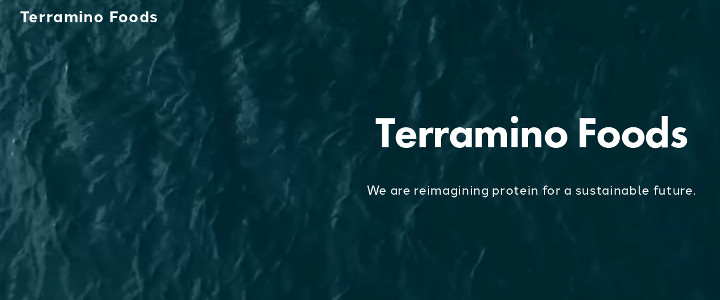Written by Beatrix Scolari
Spring 2018
Terramino Foods is a new startup company developing a fish-free alternative to seafood made from fungi. Founders Kim and Josh, both recent graduates of UC Berkeley, have invented a fermentation-based process for transforming fungi into a product that mimics the taste and texture of fish. So far, the company has developed a convincing salmon burger, is working on a salmon fillet, and intends to expand to other types of seafood in the future. Terramino products not only have the flavor and mouthfeel of fish, but are also nutritionally comparable. The fungi used is rich in bioavailable proteins and packed with Omega-3 fatty acids. However, unlike real fish, producing fungi requires a small fraction of the resources used for fishing or aquaculture. Kim and Josh hope that their company can reduce the environmental burden of the seafood industry by offering a fish alternative that is more sustainable and affordable, while also being delicious enough to satisfy the cravings of seafood lovers.
A Sea of Trouble: How the Global Seafood Industry Threatens Marine Ecosystems
According to the most recent FAO report on world fisheries, almost one-third of all fish populations are currently exploited above “biologically sustainable levels,” meaning overfished, and 58 percent are “fully fished.” Popular species are the most vulnerable to overfishing, such as Pacific bluefin tuna, whose breeding population has been reduced to just 4 percent of its original size.The wild-caught seafood industry is fraught with ecological challenges, including overfishing, high rates of bycatch, and seafloor damage by trawling and dredging. Through regulation, the global supply of wild-caught fish has reached a precarious equilibrium, where many fisheries remain perpetually on the brink of collapse.
Despite a fragile and finite supply, per-capita fish consumption has steadily increased, due entirely to an increase in aquaculture production. Aquaculture surpassed the supply of wild-caught fish in 2014, and is the fastest growing sector of food production in the world. Aquaculture has been slow to expand in the United States due to strict regulations. As a result, the United States, the largest seafood importer in the world, buys most of its fish from emerging economies, such as China, Vietnam, and Chile, with far fewer regulations. The biggest issue in the aquaculture is the use of antibiotics. Aquaculture, like terrestrial animal agriculture, relies heavily on antibiotics. 76 percent of the antibiotics used in aquaculture are also used in human medicines, which promotes dangerous antibiotic resistance. Pollution and habitat destruction are also major issues in aquaculture. Many fish farms use chemical treatments in the water, which can easily leak into nearby water systems, polluting the natural environment. And in many parts of the world, important coastal ecosystems, such as mangrove forests, are being cleared to make room for aquaculture.
My Experience: Exploring Uncharted Waters in the Startup Space
When I joined Terramino, the company was somewhere between an idea and a functioning business. The company was based in IndieBio, an accelerator for biotech startups located in San Francisco. Kim and Josh were developing their products in the IndieBio lab, sometimes sleeping on an air mattress in the office when their experiments required overnight monitoring. IndieBio provided the resources for Kim and Josh to launch Terramino, but the program would end in May, so they needed to secure funding from investors if they wanted to continue scaling their business. I was hired as a Business Development Intern to help Kim and Josh achieve this goal. Joining the company at its fledgling stage gave me the opportunity to participate in many exciting milestones. Working with my co-intern, Anna, I helped build the company website, started a marketing campaign on social media, hosted a networking event for 300 food industry professionals, pitched the business to hundreds of people at IndieBio Demo Day, celebrated the company’s first media feature in the Wall Street Journal, and contributed to the most important milestone of them all: securing seed funding to grow the business into the future.
Being part of a startup meant being flexible and becoming comfortable taking on projects I felt under-qualified to deliver. When Kim asked me to build the company website, I immediately panicked (I’m not the most technologically savvy person). I didn’t believe I could do it, but ultimately, after a few days of anxiety and after watching every SquareSpace tutorial on the Internet, I did. My work at Terramino involved many creative challenges like the website, challenges that tested my confidence and forced me out of my comfort zone.
In Reflection: Hope for the Future of Food
I will admit, I began my internship deeply skeptical of the idea that business could be both profit-driven and mission-driven. I remain skeptical, but also far more optimistic now. I came to Terramino biased against processed food. I tend to fall into the Michael Pollan camp of food philosophy, I enjoy cooking at home and generally recoil at foods that seem “unnatural” or “novel.” I believe that Americans should limit their meat and fish consumption, but I was skeptical that highly engineered meat alternatives were the right solution. My experience at Terramino forced me to critically assess my biases against these foods. It’s true that Terramino’s products are made in a lab – but it’s also true that these products are made from simple, natural ingredients in a process similar to beer making. A salmon fillet made from fungi sounds bizarre – but if it’s healthy, sustainable, and delicious, why not? I’ve always avoided highly processed foods because most are loaded with sugar, trans fats, and harmful additives, but this does not necessarily have to be true. Startups like Terramino are disrupting the food industry with new products that offer health and sustainability benefits that conventional processed foods lack, and forcing food corporations to adopt these same standards to remain competitive.
If you’re hungry for change, consider joining a food startup – or launch your own! The future of food depends on mission-driven innovation. Be hungry, be hopeful.

